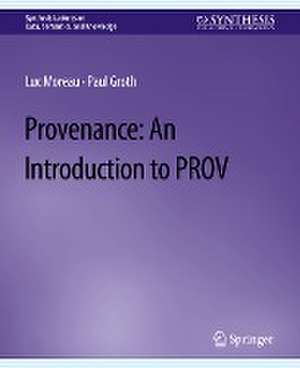Provenance: An Introduction to PROV: Synthesis Lectures on Data, Semantics, and Knowledge
Autor Luc Moreau, Paul Grothen Limba Engleză Paperback – 16 sep 2013
Din seria Synthesis Lectures on Data, Semantics, and Knowledge
- 20%
 Preț: 389.31 lei
Preț: 389.31 lei - 20%
 Preț: 413.47 lei
Preț: 413.47 lei - 20%
 Preț: 419.10 lei
Preț: 419.10 lei - 20%
 Preț: 381.89 lei
Preț: 381.89 lei -
 Preț: 412.14 lei
Preț: 412.14 lei -
 Preț: 360.01 lei
Preț: 360.01 lei -
 Preț: 234.87 lei
Preț: 234.87 lei -
 Preț: 263.28 lei
Preț: 263.28 lei -
 Preț: 173.12 lei
Preț: 173.12 lei -
 Preț: 247.72 lei
Preț: 247.72 lei -
 Preț: 279.80 lei
Preț: 279.80 lei -
 Preț: 451.48 lei
Preț: 451.48 lei -
 Preț: 448.31 lei
Preț: 448.31 lei -
 Preț: 319.12 lei
Preț: 319.12 lei -
 Preț: 234.87 lei
Preț: 234.87 lei -
 Preț: 386.30 lei
Preț: 386.30 lei -
 Preț: 351.41 lei
Preț: 351.41 lei -
 Preț: 208.41 lei
Preț: 208.41 lei -
 Preț: 191.30 lei
Preț: 191.30 lei -
 Preț: 265.78 lei
Preț: 265.78 lei -
 Preț: 209.94 lei
Preț: 209.94 lei - 20%
 Preț: 281.14 lei
Preț: 281.14 lei
Preț: 191.30 lei
Nou
Puncte Express: 287
Preț estimativ în valută:
36.60€ • 38.33$ • 30.36£
36.60€ • 38.33$ • 30.36£
Carte tipărită la comandă
Livrare economică 05-11 aprilie
Preluare comenzi: 021 569.72.76
Specificații
ISBN-13: 9783031794490
ISBN-10: 3031794494
Ilustrații: XV, 113 p.
Dimensiuni: 191 x 235 mm
Editura: Springer International Publishing
Colecția Springer
Seria Synthesis Lectures on Data, Semantics, and Knowledge
Locul publicării:Cham, Switzerland
ISBN-10: 3031794494
Ilustrații: XV, 113 p.
Dimensiuni: 191 x 235 mm
Editura: Springer International Publishing
Colecția Springer
Seria Synthesis Lectures on Data, Semantics, and Knowledge
Locul publicării:Cham, Switzerland
Cuprins
Preface.- Acknowledgments.- Introduction.- A Data Journalism Scenario.- The PROV Ontology.- Provenance Recipes.- Validation, Compliance, Quality, Replay.- Provenance Management.- Conclusion.- Bibliography.- Authors' Biographies.- Index.
Notă biografică
Professor Luc Moreau is Deputy Head (Research and Enterprise) of Electronics and Computer Science (ECS), and a member of the Web and Internet Science (WAIS) group, at the Univer sity of Southampon. He has a long-standing interest in large-scale, open, distributed systems. More recently, he initiated the field of provenance in distributed heterogeneous systems. After launching the International Provenance and Annotation Workshop (IPAW ) series in 2006, he instigated and led the highly successful Provenance Challenge, an activity that took place three times, to investigate the interoperability of provenance systems. is has involved over 20 teams across the world, from academia and industry, including a mix of disciplines from end users to technologists. It resulted in the Open Provenance Model (OPM) specification, a model with a growing community adoption, and a key driver for a follow-on standardization activity. en, Luc Moreau co-chaired the W3C Provenance Working Group, and co-edited three recommendations related to the W3C PROV provenance modelPaul Groth is an assistant professor in the Web & Media Group at the VU University of Amsterdam and a member of its Network Institute. He holds a Ph.D. in Computer Science from the University of Southampton (2007) and has done research at the University of South ern California. His research focuses on dealing with large amounts of diverse contextualized knowledge with a particular focus on the web and e-Science applications. is includes re search in data provenance, web science, knowledge integration and knowledge sharing. He has over over 60 publications in these areas. Paul is an active member of the Semantic Web and provenance communities serving on numerous program and organization committees. Paul co chaired the W3C Provenance Working Group. Currently, he is lead architect of Open PHACTS (http://www.openphacts.org) - a project to develop a provenance-enabled platform for phar macological data integration. H
